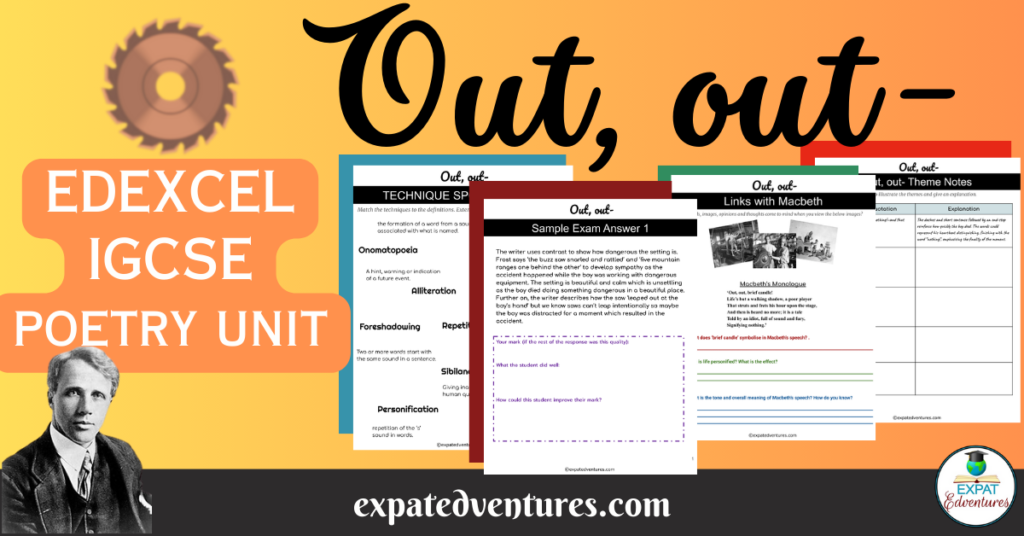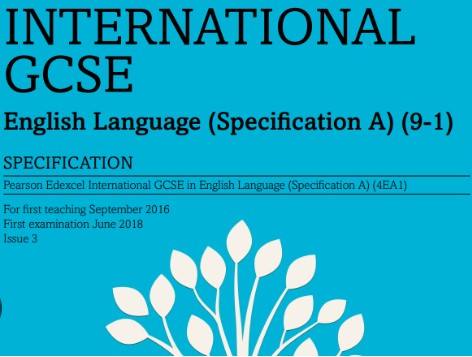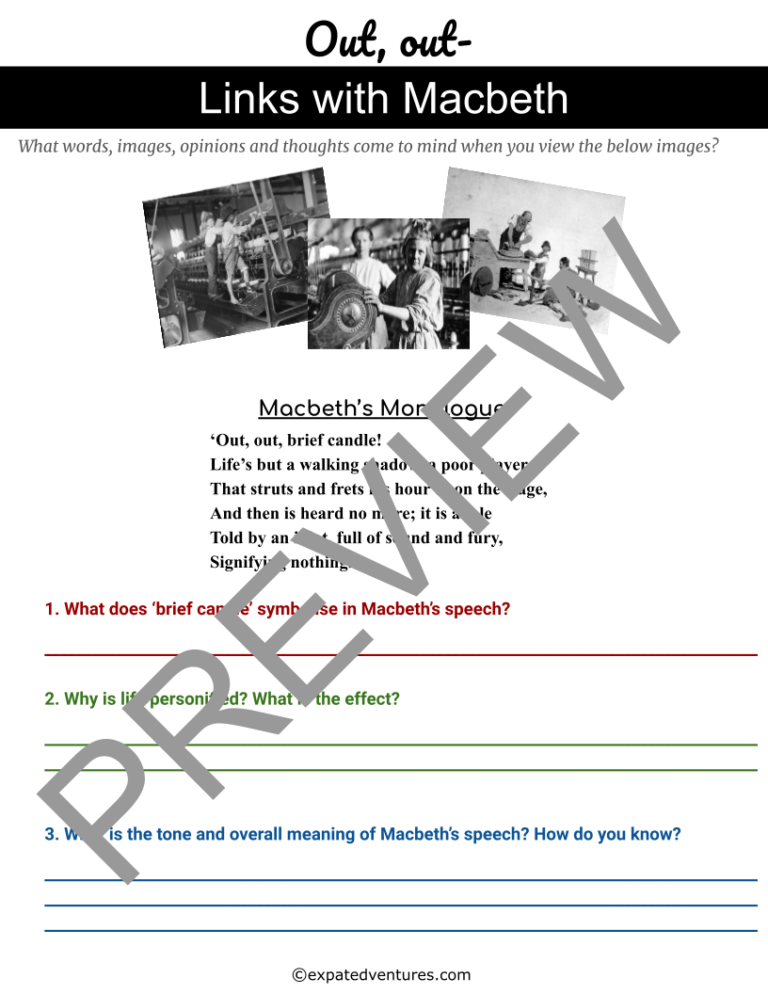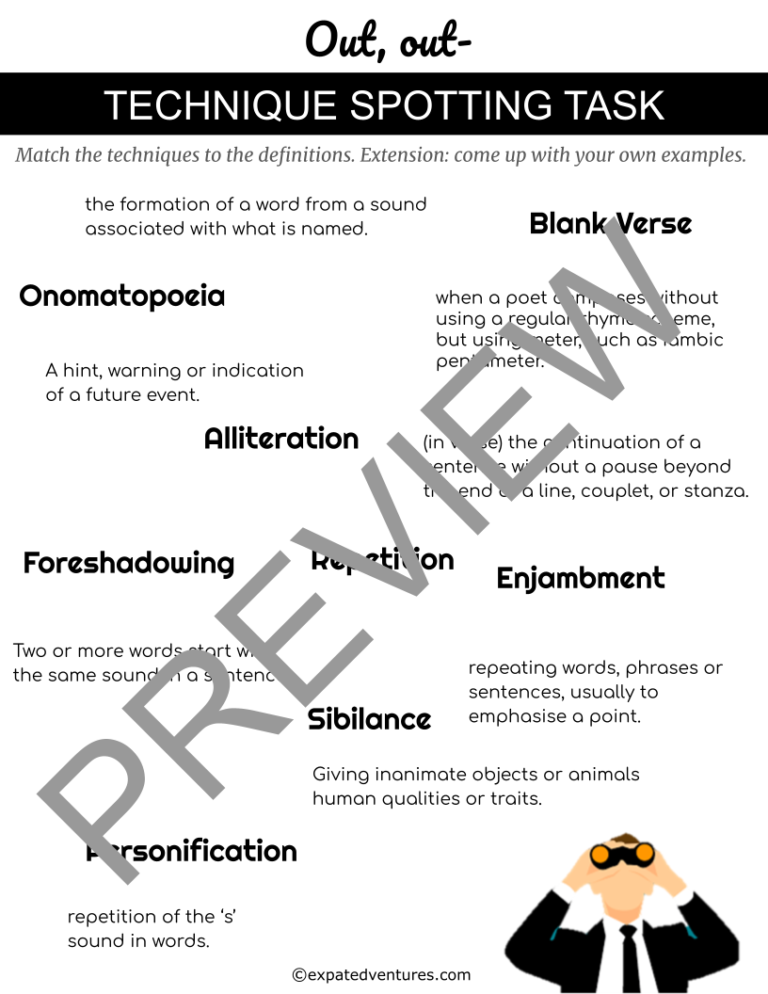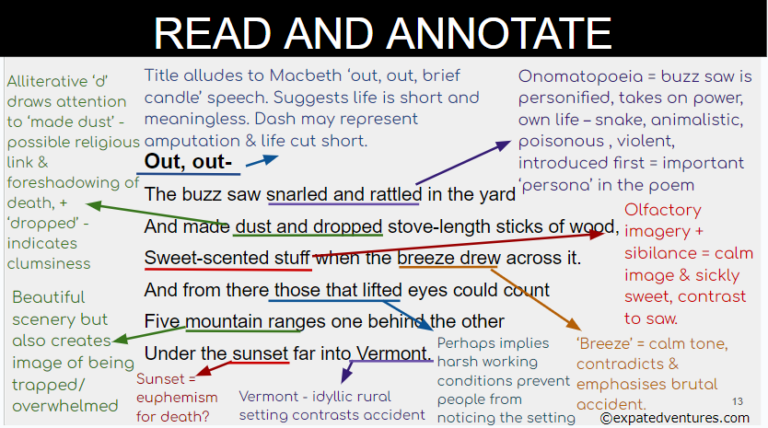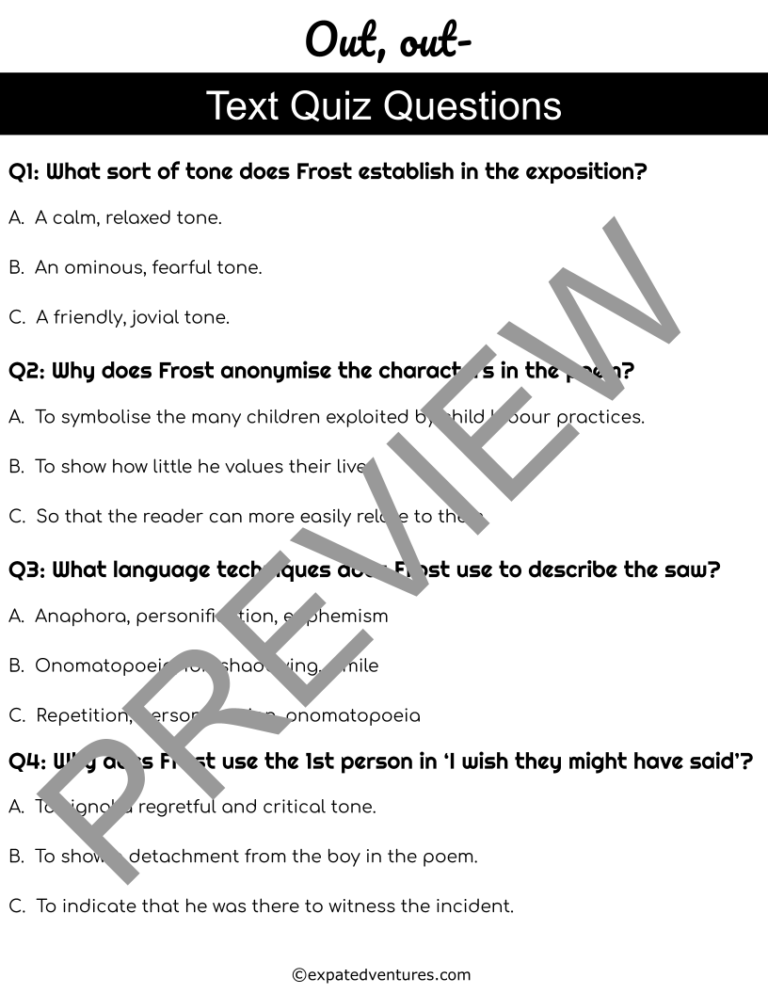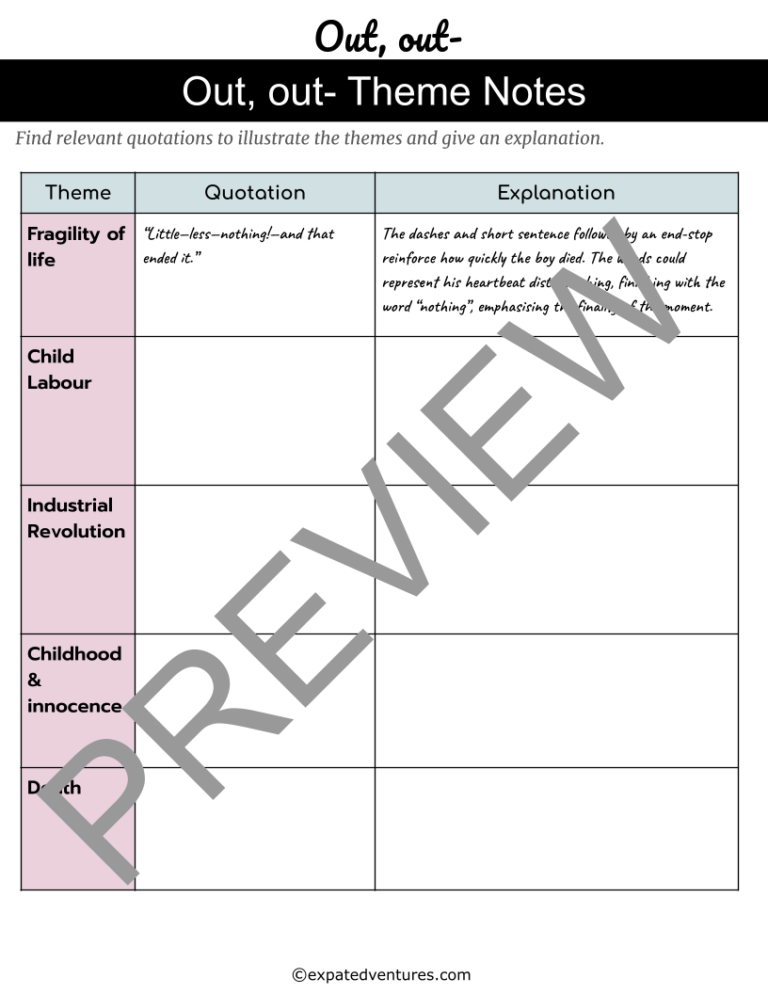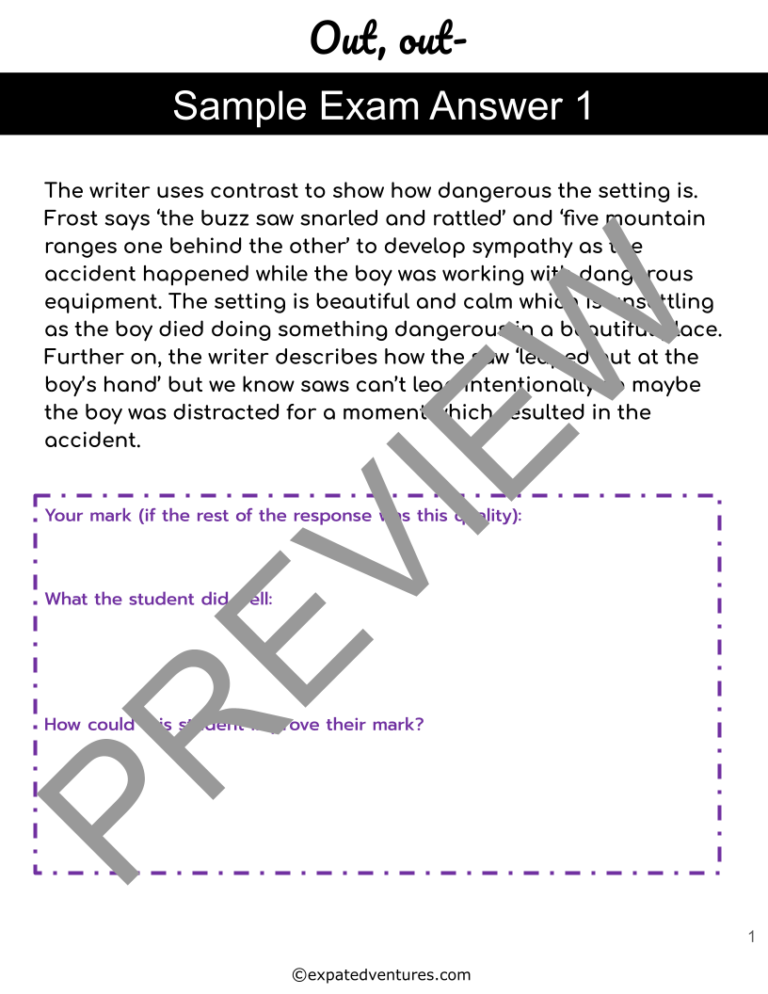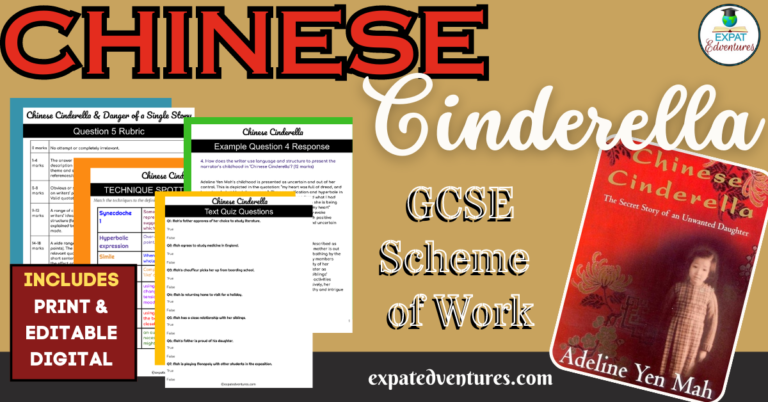The poem ‘Out, out-‘ by Robert Frost is currently taught on the Edexcel GCSE/IGCSE English Language Paper 2 curriculum. It is one of the 10 prose and poetry anthology texts which students answer on for Question 1. This ‘Out, out-‘ GCSE poetry unit includes a completed annotated text, quiz questions with an answer key, a rubric and example answers for students to mark.
‘Out, out-‘ tells the tragic story of a young boy who suffers a tragic accident whilst operating a buzz saw. It was written in 1916 and alludes to the practice of child labour, common during the Industrial Revolution. The themes of death, the fragility of life, exploitation and apathy are highlighted by the reference to Macbeth’s famous ‘out, out brief candle’ speech. He delivered this nihilistic speech after hearing news of Lady Macbeth’s death, exploring the meaningless and brevity of life.
Robert Frost uses a range of language and structural techniques, from enjambment to onomatopoeia to repetition to illustrate his tragic message to his readers; but how can we support students to capture that in their exam essays? How can we break it down to consider not only the literal story of a tragic accident, but the wider theme of child labour and how we as humans process death?
'Out, out-' GCSE Poetry Unit of Work
I’ve created a GCSE Poetry scheme of work for busy teachers to take you step-by-step through the poem. It contains everything from an engaging, thought-provoking starter, to identifying language techniques, to analysing and annotating the poem, to practising the Question 1 30-marker. This resource contains editable Google slides, quizzes with answer keys, sample exam questions, example exam answers and close textual annotations of the whole GCSE poem. All activities are ready to download and print in PDF form or there are links for you to personalise them if you wish.
Edexcel IGCSE English Language Exam Paper 2
The 1 hour 30 minutes Edexcel IGCSE English Language Paper 2 exam is split into Section A and Section B. Section A is the reading assessment and candidates are presented with one of the 10 prose and poetry anthology texts. The prose texts are between 1.5 and 2.5 pages long and the poems are approximately 1 page. They have 1 30-mark question to answer, which is usually based on a broad theme from the selected text, such as death, strong emotions, sympathy or conflict. Candidates are provided with 3 bullet points which give guidance as to what to include in the response.
Section B is an imaginative writing assessment. Candidates choose between three options, which are normally loosely based on the Section A text.
- Question 2 tends to be a personal question. For example, write about a time you overcame a challenge. The response can be real or imagined.
- Question 3 tends to give the title of a story, and candidates are required to write the story.
- Question 4 usually provides a set of 2-3 images which students may use as a stimulus to write a story.
Edexcel Out, out- IGCSE Poetry Resources
To introduce the poem ‘Out, out-‘, I give students some images of child labour practices and the Industrial Revolution. I then hold a quick class discussion to ascertain how much they know about the time period and practices. Next, I remind (or introduce if students have not studied Macbeth) the ‘Out, out brief candle’ speech. I tell students that Macbeth delivered this speech following news that Lady Macbeth had commit suicide following their murderous climb to royalty. There are some great clips on YouTube of actors performing this famous, nihilistic speech. These are good to play to students to give them an idea of the grave tone of this speech. It prepares them for the bleak tone of ‘Out, out-‘ as explored in this GCSE poetry unit.
'Out, out-' GCSE Poetry Techniques
Before diving into the text, I quickly review key language techniques in the poem so that they are fresh in students’ minds as they read. A matching activity is included in this resource. Students match the definition and technique, which they can either copy, cut and paste or simply number. As an extension, students can write their own examples of the techniques. This is also a useful revision tool for and any GCSE poetry exam. When they know the language techniques implicitly, they naturally refer to them in their analysis and raise their marks.
Out, out- IGCSE Extract Text Annotations
Before close textual analysis, I often ask students to do an initial reading or simply listen to the poem for the tone and literal reading. It is a fairly straightforward poem for students to understand on a surface level – a description of a tragic accident. The challenge comes in unpacking how Frost presents the death, the reactions of those around the victim and the links to common child labour practices.
When it comes to closely analysing the lines of the poem, there are a few ways of approaching the activity. You can read and annotate together with students completing the annotations in real time. Alternatively, you can split students into groups and ask each group to focus on a certain number of lines before feeding back to the class. Or you could read and discuss, then ask students to complete the annotations for homework.
There are many ways of approaching close textual analysis; I find that varying the method for different texts keeps students interested through the unit. For poems specifically, I tend to do annotations as a class activity as poetry can be more abstract and harder for students to grasp than prose texts. This ’Out, out-‘ IGCSE scheme of work contains detailed annotations of the whole poem.
Edexcel ‘Out, out-‘ GCSE Poetry Unit Quiz with Answer Key
After analysing the poem, I do a quick AFL quiz with students to assess their understanding of the language and structure of the poem, then introduce exam practice questions. Quiz questions for a straightforward low stakes multiple choice quiz with answers are available on the slides and in PDF form with this resource. Depending on your time and the nature of your class, you can do this as a whole class activity on the interactive whiteboard or hand out to students to do in pairs or individually.
Question 1 on the IGCSE English Language Paper 2 exam is a 30-mark question on one of the 10 anthology prose and poetry texts. You can find them in Part 2 of the anthology. Although it is 1 question, it is quite high stakes as students don’t have anywhere to hide; they must perform on this question. I reinforce to them that they must know all 10 of the texts very well to write a detailed essay on just one of them in the exam.
In this ‘Out, out-‘ GCSE poetry unit, there is a rubric, paragraph sorting and structure activity and example answers for students to mark. I have also included a planning and revision sheet, including sections for students to write notes and quotes on various themes in the poem ‘Out, out-‘.
Edexcel ‘Out, out-‘ GCSE Poetry Unit Essay Examples
For the question 1 past paper prompt, firstly, take students through the rubric so that they familiarise themselves with how the response is awarded. Then, you can take students through the example PETER paragraph (point, evidence, technique, explain, refer). If you wish, you can ask them to order the parts of the example paragraph, so they grapple with the concept of a cohesive paragraph. This way, there are scaffolds in place to support students to produce high quality responses and you can demonstrate how the paragraph hits the mark scheme pointers, such as exploring techniques and use of vocabulary for effect. It also directly links to the question, which is something examiners look for.
Included in this ‘Out, out-‘ GCSE poetry scheme of work, I have provided 3 example responses of varying quality. For each response, ask students to put themselves in the examiner’s shoes and mark the answer using the rubric. Then, students can explain what the answer did well and areas to improve. As an extension, students can develop the weakest example answer. Hold a class discussion about the answers before revealing the examiner’s marks (included in the notes on the slides).
Essentially, to be awarded full marks, there should be evidence of perceptive analysis. I explain to students that the answer goes beyond ‘obvious’ points and draws out the writer’s range of feelings and relation to the reader. Consider whether the writer changes their perspective and how language and structure connect for effect, for example a long syndetic list can also contain strong, emotive verbs. Quotations must be relevant to the points made for a student to fall in the top band of the mark scheme, and multiple quotations should be used through the response.
Edexcel GCSE English Language Imaginative Writing Practice
There are also a couple of creative activities included in this resource. Time-permitting, this is a fantastic text to base a creative or transactional writing piece around. You could have students write a newspaper article about this tragic event, or imagine the boy survived and write an account of his life after the accident. This can help develop skills required for Section B of Paper 1 (Transactional Writing) and Section B of Paper 2 (Imaginative Writing).
Edexcel GCSE Poetry Revision
To sum up, some of the best techniques for teaching the 10 prose and poetry texts include:
- Hook students with an intriguing starter activity
- Use alternative methods to closely analyse and annotate the text
- Quiz students for quick AFL strategy to assess whether they are engaging with the text
- Practise past paper questions
- Study model answers, including examples of typical mistakes students make in the exam responses
- Offer an optional creative activity as homework or an extension to challenge students’ perceptions of the text
Good luck teaching Out, out-, it’s a harrowing poem which many students enjoy studying as it is rich with poetic devices and techniques. Comment below if you can add any useful teaching and learning techniques for this text. If you enjoyed this article about teaching Out, out-, you might also find value in my Edexcel IGCSE Paper 1 guides and resources for The Danger of a Single Story, The Explorer’s Daughter and A Game of Polo with a Headless Goat.

